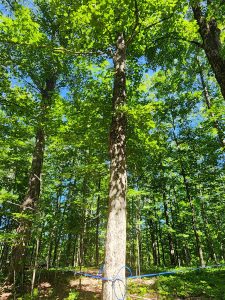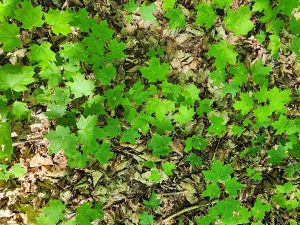Maple Sugarbush Management Conference

Governor’s Event Center in Waterville
376 Main Street, Waterville, Maine
Directions (Google Maps)
Event Has Passed: August 11, 2023, 8:30 a.m.-3:30 p.m.
The University of Maine Cooperative Extension’s Maple Program is hosting the 2023 Maple Sugarbush Management Conference at the Governor’s Events Center in Waterville, Maine. At this full-day program, maple and forestry research specialists, and maple sugarbush managers will share information about optimizing the health and productivity of maple sugarbushes.
Topics will include:
 Climate projections and risks to hardwood forests,
Climate projections and risks to hardwood forests,- Approaches for maximizing maple forest regeneration and overall health,
- Forest pest monitoring and prevention strategies,
- Mapping sugarbushes and tubing systems to support management decisions,
- Financial and marketing opportunities related to enhancing sugarbush resilience,
- And more.
This program has been approved for 1 Pesticide Applicator Credit AND for 4 category 1 CEUs from the Society of American Foresters (SAF).
August 9, 2023, Please Note:
While the registration deadline of August 8 has passed:
- Walk-in registration will be available.
- Payment by check only.
- Lunch is NOT guaranteed for same-day registrations.
Registration Cost: $45
(includes lunch and refreshments)
This program is intended for maple sugarbush owners and managers, foresters, loggers, and those interested in learning more about this specialized use of our Maine woods.
Agenda for August 11, 2023:
8:30–9:00 a.m. — Welcome
Jason Lilley, University of Maine Cooperative Extension Maple Industry Educator
9:00–9:40 a.m. — The State of the Sugar Maple: Current Climate Stressors, and Future Projections
Ali Kosiba, Extension Assistant Professor of Forestry at the University of Vermont
Learn about the current state of maple species health and stressors. This session will focus on climate trends and projection as related to maple health productivity.
9:40–10:15 a.m. — Foresters’ Approaches to Sugarbush Management: Survey Results and Management Best Practices
Mark Isselhardt, Maple Specialist with the University of Vermont
Cultivating healthy crop trees lies at the heart of sustainable sugarbush management. This presentation will draw from recent research to cover key factors to consider including Sugarbush silviculture, climate change, regeneration, soil amendments, and tapping guidelines.
10:15–10:35 a.m. — Break
Visit booths of land and business planning resources: Land for Good, Maine Forest Service, Maine Farmland Trust, Maine Woodland Owners, Department of Ag, Conservation, and Forestry
10:35–11:05 a.m. — Forest Pests of Concern in the Sugarbush: Monitoring, Effects, and Viability of Treatment
Colleen Teerling, Entomologist, Maine Forest Service
Learn about common insect pests that favor maple species and best practices for minimizing their impact as recommended by the Maine Forest Service.
11:05–11:35 a.m. — Invasive Plant Management
Catherine Spolarich, Invasive Plant Biologist Maine Natural Areas Program
Invasive plant species are encroaching on many forested areas, particularly in the Southern part of the state. We will discuss management strategies for controlling these detrimental species.
11:35–11:50 a.m. — Tools for Mapping the Sugarbush at Maple Mills LLC
Nick Staley, Maple Mills LLC Owner and Operator
At Maple Mills LLC, owner and operator Nick Staley has put significant effort into developing plans and approaches to managing the sugarbush for long-term health and viability. Learn about the resources they have used for developing these plans, including extensive mapping to highlight aspects of the maple woods and tubing systems.
11:50 a.m.–12:50 p.m. — Lunch
Visit booths of land and business planning resources: Land for Good, Maine Forest Service, Maine Farmland Trust, Maine Woodland Owners, Department of Ag, Conservation, and Forestry
12:50–1:15 p.m. — Management Considerations for Promoting Regeneration and Overall Stand Health
Jim Ferrante, District Forester, Maine Forest Service
What are the best practices when it comes to silvicultural approaches in the sugarbush? Learn about key factors that a forester considers when making recommendations to maximize the overall health of the stand.
1:15–1:35 p.m. — NRCS Financial and Technical Support for Forest Management Plan Development, and Conservation Practices
Chuck Penney, USDA, Natural Resources Conservation Service
Participants will learn about the variety of ways that the USDA Natural Resources Conservation Service can support the management of their maple sugarbushes. Programs include cost share for forest stand improvement, stream crossings, access roads, water diversion and management, forest management plan development, invasive control, and more.
1:35–2:05 p.m. — Forest Carbon Markets: Potential and Pitfalls
Tom Doak, Executive Directory of Maine Woodland Owners
Carbon markets are a quickly developing opportunity for woodland owners. Maple woods are uniquely positioned to be a key player in these markets, and to be an additional financial opportunity for sugarmakers. Learn about the complexity of these markets in this talk.
2:05–2:20 p.m. — Break
Visit booths of land and business planning resources: Land for Good, Maine Forest Service, Maine Farmland Trust, Maine Woodland Owners, Department of Ag, Conservation, and Forestry
2:20–2:40 p.m. — Bird Friendly Sugarbush Program
Steve Hagenbuch, Vermont Audubon
The Audubon’s Bird Friendly Maple (BFM) Program has had great success in Vermont and is now launching in Maine. Learn about the benefits of the BFM program for your marketing and for the creation of bird habitats. We’ll also discuss how the requirements of this program fit easily into other management and financial incentive programs.
2:40–3:00 p.m. — Producer Spotlight: True Mountain Maple Syrup
Mark Prentiss, Owner and Operator of True Mountain Maple Syrup
Mark Prentiss of True Mountain Maple Syrup in Industry, Maine has been managing their sugarbush with an eye towards sustainability. Learn about his approach to management, and the resources that he has relied upon to inform his management.
3:00–3:30 p.m. — Social Hour / Vendor Booth Time and/ Adjournment
Visit booths of land and business planning resources: Land for Good, Maine Forest Service, Maine Farmland Trust, Maine Woodland Owners, Department of Ag, Conservation, and Forestry
This program is supported by the USDA Rural Resources Extension Act (RREA)
If you need an accommodation to participate in this program, please contact Jason Lilley at jason.lilley@maine.edu, or call 207.781.6099 or 800.287.1495 (in Maine) to discuss your needs. Receiving requests for accommodations at least 10 days before the program provides a reasonable amount of time to meet the request, however, all requests will be considered.
Vendors
- Land for Good
- Maine Forest Service DF’s
- Maine Woodland Owners
- DACF Land Access/ Tree Farm, NRCS
- University of Maine Cooperative Extension
- Maine Natural Areas Program
- Audubon: Bird-Friendly Maple
- Maine Farmland Trust
- Maine Association of Conservation Districts
- USDA Rural Development (REAP)
In complying with the letter and spirit of applicable laws and pursuing its own goals of diversity, the University of Maine System does not discriminate on the grounds of race, color, religion, sex, sexual orientation, transgender status, gender, gender identity or expression, ethnicity, national origin, citizenship status, familial status, ancestry, age, disability physical or mental, genetic information, or veterans or military status in employment, education, and all other programs and activities. The University provides reasonable accommodations to qualified individuals with disabilities upon request. The following person has been designated to handle inquiries regarding non-discrimination policies: Director of Equal Opportunity, 101 Boudreau Hall, University of Maine, Orono, ME 04469-5754, 207.581.1226, TTY 711 (Maine Relay System).
